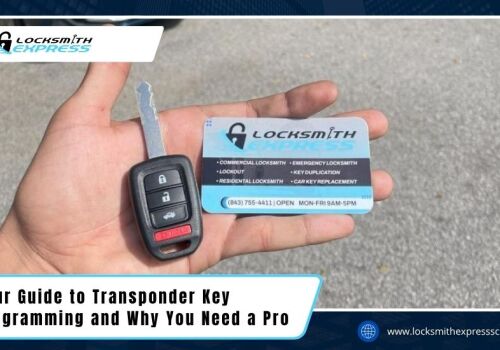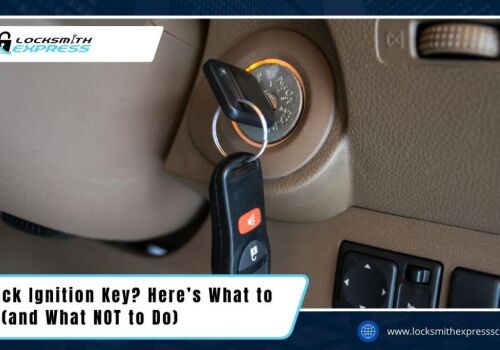Rekeying a lock is an important skill for homeowners. Whether you've lost your keys or want to enhance your security, knowing how to rekey a lock can save you money and give you peace of mind. This guide will cover everything you need to know about lock rekeying, including when to rekey versus replace a lock, how to do it yourself, and when to call a professional locksmith.
- When to Rekey vs. Replace a Lock
- Step-by-Step Guide to Rekeying a Lock
- Different Types of Locks and Rekeying Methods
- DIY vs. Professional Rekeying Services
- Common Issues When Rekeying a Lock
- When to Call a Locksmith
- Secure Your Home with Locksmith Express
- Frequently Asked Questions
- How do I know if my lock can be rekeyed?Â
- Can I rekey a smart lock?Â
- How long does it take to rekey a lock?Â
- Is rekeying cheaper than changing the locks?Â
- What tools do I need to rekey a lock?Â
- Trust Locksmith Express for Your Lock Needs
When to Rekey vs. Replace a Lock
Understanding when to rekey a lock versus replacing it is crucial for security. Here are some situations where rekeying is a good option:
- Lost Keys: If you lose your keys, rekeying allows you to create a new key for the same lock. This ensures no one can access your home with the lost key.
- New Home: It's a good idea to rekey the locks when moving into a new home. Previous owners or their friends may still have keys.
- Security Concerns: If you feel that your security has been compromised, rekeying can give you a fresh start with your locks.
However, there are times when replacing a lock might be better:
- Worn Out Locks: If your locks are old or damaged, replacing them is often a safer choice.
- Upgrading Security: If you want better security features, like smart locks, replacing your old locks is the way to go.
- Different Key Needs: If you want a completely different key system, you must replace the locks.
Step-by-Step Guide to Rekeying a Lock
Rekeying a lock can be done at home with the right tools and patience. Here's a simple guide to help you through the process:
- Gather Your Tools: You will need a rekey kit, a screwdriver, and the new keys.
- Remove the Lock: Use a screwdriver to take the lock out of the door.
- Disassemble the Lock: Open the lock cylinder to access the pins. This is where you will make changes.
- Replace the Pins: Take out the old pins and replace them with new ones from the rekey kit that match your new key.
- Reassemble the Lock: Put the lock back together carefully. Make sure all parts are in place.
- Test the New Key: Before reinstalling, test the new key to ensure it works smoothly.
Different Types of Locks and Rekeying Methods
Not all locks are the same, and knowing your type of lock can help you choose the right rekeying method. Here are some common types of locks and how to rekey them:
- Pin Tumbler Locks: These are the most common residential locks. They have a series of pins that need to match the new key. Most rekey kits are designed for these locks.
- Deadbolt Locks: Deadbolts provide extra security. The rekeying process is similar to pin tumbler locks. Ensure you follow the steps carefully to avoid any issues.
- Smart Locks: Some smart locks can be rekeyed digitally. Check the manufacturer's instructions, as the process can vary significantly from traditional locks.
- Mortise Locks: These are heavier and often found in commercial buildings. Rekeying a mortise lock is more complex and may require special tools.
- Wafer Locks: Wafer locks are often used in cabinets and desks. They have a different pin mechanism and may need a specific rekeying kit.
DIY vs. Professional Rekeying Services
When deciding whether to rekey a lock yourself or hire a professional, consider the following:
| Aspect | DIY Rekeying | Professional Rekeying Services |
| Cost | Lower cost, primarily for tools and supplies. | Higher cost due to service fees and expertise. |
| Time Commitment | Requires more time for learning and execution. | Quick turnaround, usually completed in a short time. |
| Skill Level Required | Basic skills required; learning curve involved. | No special skills required; experts handle everything. |
| Risk of Errors | Higher risk of mistakes, which may lead to security issues. | Low risk; professionals ensure proper rekeying and security. |
| Tools Needed | Basic tools (screwdriver, rekeying kit). | Professional tools and equipment. |
| Satisfaction | Sense of accomplishment if done correctly. | Guaranteed satisfaction with expert service. |
| When to Choose | When comfortable with DIY tasks and minor adjustments. | When seeking reliability and expertise, or for complex locks. |
Common Issues When Rekeying a Lock
Even experienced DIYers can run into problems when rekeying locks. Here are some common issues and how to fix them:
- Key Doesn't Turn: You may have mismatched pins if your new key doesn't turn in the lock. Double-check that the new pins fit the key properly.
- Lock Won't Reassemble: Ensure all parts are aligned if the lock doesn't go back together smoothly. Sometimes, small pieces can get stuck or misaligned.
- Old Pins Left Inside: Remove them carefully if old pins are stuck in the cylinder. They can interfere with the new key.
When to Call a Locksmith
While many people can successfully rekey their locks, sometimes it's best to call a locksmith. Consider the following situations:
- Complex Locks: If you have a high-security lock or system requiring special tools, hiring a professional is wise.
- Multiple Locks: If you have several locks to rekey, a locksmith can often do it more quickly and efficiently.
- Inexperience: If you're unsure about the rekeying process, a professional can ensure that the job is done correctly and safely.
- Key Loss: If you've lost the original key and can't rekey the lock, a locksmith can help you find a solution.
- Security Concerns: If you're worried about security, hiring a locksmith is a smart choice. They can assess your entire locking system and recommend improvements.
Secure Your Home with Locksmith Express
Rekeying a lock can be a practical solution for improving security without replacing the entire lock. By understanding the types of locks and the rekeying methods available. Whether you decide to tackle the job yourself or hire a professional, knowing when to rekey can help you maintain control over your home's security.
if you encounter any difficulties or prefer expert help, Locksmith Express is here to assist you.
Frequently Asked Questions
How do I know if my lock can be rekeyed?
Most standard locks, including pin tumbler and deadbolts, can be rekeyed. Check your lock's manufacturer for specific guidance.
Can I rekey a smart lock?
Some smart locks allow rekeying, but the process can differ from traditional locks. Refer to the user manual for detailed instructions.
How long does it take to rekey a lock?
Rekeying a lock usually takes about 15 to 30 minutes for someone experienced. For beginners, it might take longer.
Is rekeying cheaper than changing the locks?
Yes, rekeying is generally more cost-effective than replacing locks. It's a great way to maintain security without spending a lot.
What tools do I need to rekey a lock?
You typically need a rekeying kit, a screwdriver, and possibly pliers, depending on the type of lock.
Trust Locksmith Express for Your Lock Needs
Now that you know how to rekey a lock, take action to enhance your home security with Locksmith Express. If you're feeling confident, gather your tools and try rekeying a lock yourself. Remember to follow the step-by-step guide to ensure you do it correctly.
If you prefer, consider hiring Locksmith Express to handle the job for you. Our expert locksmiths can offer the experience you need and save you time. Whichever route you choose, keeping your home safe is the priority.
Feel free to share this guide with friends and family who might also need to rekey their locks. For more home security tips and guides, explore our other articles or subscribe to our newsletter for regular updates from Locksmith Express.
Call us at (843) 755-4411 for immediate assistance or to schedule a service.









